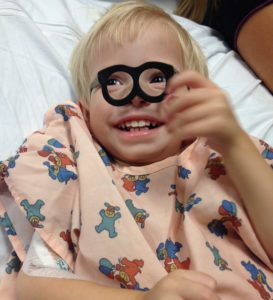
Due to the serious nature of MMIHS and the numerous complications that go along with managing the syndrome, many families have experienced frequent trips to their local Emergency Room. Given how rare MMIHS is, it is likely that the ER personnel will have very little knowledge, if any at all about the syndrome or experience in treating a patient with it. Some families live in extremely rural areas without access to a children's hospital therefore, their personal expertise is crucial in providing the care and treatment that the patients require.
This list of tips was put together by families of MMIHS patients who have learned some tricks of the trade when heading into the ER. We hope it helps and if you have anything to add be sure to use our contact page to get in touch!
Expecting the Unexpected
Here is a list of a couple things you can do ahead of time in preparation for an ER visit that goes as smoothly as possible.
Contact the local EMS services so they are aware of your child and where you live. Give them a copy of your information folder (see below) and make a plan ahead of time for what procedures you will follow if you need their services.
Pack an EMERGENCY bag that contains some essential items that you can grab at a moments notice that will get you through at least 24 hours. It might include things such as:
- clothes/hygiene items
- toys or activities if you will be entertaining a child
- PHONE CHARGERS
Have a few copies of a folder that contains pertinent information for the ER personnel to keep so you can just hand it over when they begin their assessment. The staff will really appreciate it and saves you from repeating and explaining everything. It should include things such as:
- contact information for any and all doctors/specialists that have worked with the patient
- an updated sheet of all current medications and doses
- a list of most recent surgeries with explanation
- a list of most recent hospitalizations with explanations
- line care procedures that you would like them to follow
- a few copies of the MMIHS.ORG brochure to provide to the staff
- Extra Tip: Keep 1 copy in your purse/car at all times, 1 in a diaper bag or personal backpack and 1 electronic copy you can access if necessary
Be aware of the actual, non-medicated temperature at which your doctor suggests an ER visit. Keep in mind that if you are administering Tylenol at home, it is likely masking the actual temperature.
Heading to the ER
- Call your most trusted specialist or doctor on the way to ER and give them heads up that you are going so they can be ready to consult with ER staff
- When the reason for the ER visit is due to fever, always insist that blood cultures are drawn prior to the administration of antibiotics
- Also insist that blood is draw from the line AND peripherally so the cultures can be compared
- Request a urine culture if not suggested
- When possible and if applicable, bring your child/self already connected to TPN or have it ready to hook up when needed since you could be waiting for HOURS before IV fluids are even administered in the hospital
- Ask to be put in a private room immediately so there is no further exposure to the germs and illnesses in the waiting room.
- Watch every nurse and doctor very closely when they touch the central line and tell them BEFORE they touch it that you are very strict about line care and that you require they do the steps you follow when dealing with your/your child's line. Don't assume they know!